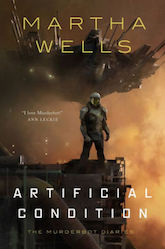When we had last left our favorite Murderbot, it was fleeing, leaving the beginnings of a comfortable life behind, before that life had even started—departing PresevationAux and Mensah, who had given Murderbot a path out of being a SecUnit. But what is a Murderbot, whether sentient or not, who doesn’t do murderbotting? Is this the Artificial Condition indicated in the title?
No—Murderbot is on a mission to discover what happened in the “incident” in which, not yet sentient, it killed lots and lots of clients in a mining facility and had its memory partially wiped. There is a trauma that haunts Murderbot now that it’s alive, awake, and in possession of a conscience, however snarky it is. In the previous installment of the Murderbot Diaries, All Systems Red (which I wrote about here), Murderbot was just beginning to find its footing, with a newfound sense of emotional agency, and a sense of belonging to something that’s more than a purely contractual connection. In the midst of forging this new identity, however, the very conditions that allowed it to form new bonds also opened up these old wounds, and so it had to leave the comfort of what it was just beginning to know.
So after you’ve ever given up everyone you’ve ever cared about and you set out on your own—what about the other people who come into your life? Even if you don’t want them to?
Enter ART.
***
I know this might be hard to believe, but trans women aren’t a monolith.
Little did I know this when I first came out! I had been, like so many other people, inundated with a flattened (and whitened) depiction of trans women in just a few narrow stereotypes. The best I thought I could hope for was to aim for a kind of earnest stereotype that was just entering into broad public consciousness—one who ascribed pretty closely to a sincere trans woman hoping to “pass” and not rock the boat.
Of course, this got gloriously shot to hell once I started meeting other trans women. Yes, we often joke about all knowing each other—about all liking roller derby and tube socks and working in IT. But I can assure you, this is not the case.
What’s more, some trans women are irascible. Some are “difficult.” (Often for really excellent reasons, including targeted street violence, harassment, and lack of access to health care, for example.) Some trans women are difficult, but you still want to be really good friends with them, even if you don’t know it yet. And of course, you’re not going to click with everyone, or even with a lot of people. There’s a difference between being “difficult” and worth someone’s time and being toxic.
Friendship is tricky when you are first fully becoming yourself.
When Murderbot gets transport to the mining facility on an empty research vessel—using its vast media library from Space Netflix as a form of currency—it thinks little of it. Murderbot doesn’t remotely consider that the transport ship it’s smuggled itself on-board could possibly have its own wants and needs.
However, it soon realizes that it’s made a huge mistake: ““How the hell was I supposed to know there were transports sentient enough to be mean?”
How indeed, Murderbot? How indeed.
***
Buy the Book


Artificial Condition: The Murderbot Diaries
ART—a Murderbot-derived acronym for “Asshole Research Transport”—is sarcastic; or at least Murderbot reads every attempt at communication as sarcastic. With the amount of processing power ART has, and with the fact that Murderbot is hanging out in its belly for the duration of a long journey, Murderbot is forced to engage with it. In a cascade of “oh shit” moments, Murderbot slowly realizes that ART wanted company on the long voyage…which is the last thing Murderbot wants.
As in All Systems Red, creating relationships in the midst of boredom, usually through the copious use of Space Netflix, plays a huge part in the narrative. It’s their shared enjoyment of Murderbot’s favorite serials that draws ART out of its shell (Murderbot notes that some metaphorical hand-holding is required when ART became “emotionally compromised by a fictional media serial.”). And it’s the way an unlikely friendship develops.
ART has no qualms about asking Murderbot tough questions. It’s difficult when you’ve worked hard to establish an identity, however fragile it may be, and other queer people start poking holes in it. Even out of concern.
“You will be identified as a SecUnit.”
That stung a little. “I can pass as an augmented human.” Augmented humans are still considered humans. I don’t know if there are any augmented humans with enough implants to resemble a SecUnit. It seems unlikely a human would want that many implants, or would survive whatever catastrophic injury might make them necessary. But humans are weird. Whatever, I didn’t intend to let anyone see more than I absolutely had to.
“You look like a SecUnit. You move like a SecUnit.”
To me this stung as much as anything I’ve read in awhile, because this is a conversation about passing. And you don’t really want to hear about passing from someone else who is in a not-quite-similar situation as yourself.
What makes this so difficult is—let’s say you do want to pass, as fraught with peril as that concept is. Maybe to blend in at a new job, or maybe it’s an issue of survival, of not wanting to be harassed on the street (or in the case of our Murderbot, being captured for being seen as a rogue SecUnit). Such advice about eyeliner or posture or voice pitch or whatever, when unsolicited from a cis person, is nigh well unbearable. But when it comes from someone who’s been more or less in the same boat as you, it can be frustrating because it can be right. Or at least right-ish.
And maybe it’s not only your new friends that are stubborn.
So ART literally helps Murderbot to pass: in its medical suite, it shortens Murderbot’s arms and legs (all SecUnits have a uniform height), and to essentially create “a list of biological features that humans might notice subliminally.” (Such as hair; this was especially poignant, as getting rid of the hair you don’t want and growing the hair you do want can be a constant battle as a trans woman.)
Murderbot has to trust ART to implement these changes. It’s desperate enough to place part of its—how else do I put this—transition into ART’s metaphorical hands. The impetus behind the decision being that Murderbot has places to go, and places to be. Theory is wonderful, but actually putting one’s body on the line to try to meet important goals is another story altogether.
***
Murderbot’s goal, then, is to investigate the horrendous mining incident, which led to it hacking its Governor Module. And here is where ART really shines. Despite all the snarkiness and the borderline frenemy status between these two non-humans (ART seems to gain a great deal of satisfaction from telling Murderbot “I told you so”), ART puts its, er, money where its mouth is, and acts as Murderbot’s constant virtual companion while it orbits the mining colony, providing constant backup during the investigation, which of course becomes a lot more complicated than Murderbot had originally expected.
ART is a striking reminder that it’s not always the most outwardly “nice” peers who are the most reliable friends. Rather, it might be someone who’s irascible, pedantic, or “difficult” that will offer support and loyalty when it’s most needed. Those outward traits and apparent hostility don’t exist in a vacuum, however, and often mask a deep desire for connection—and ART just does stuff for Murderbot, like sterilizing surfaces and destroying evidence once things go south. And although those two go their separate ways, Murderbot is emotional at its departure. Murderbot itself is well aware of how it puts up its own masks and barriers to keep others from getting to know it better. Changing one’s entire life and mode of being takes time. But Murderbot discovers that it can still keep, and perhaps reconfigure, those barriers, while still being helpful and even grateful to others it comes across in its travels. That is perhaps the strongest lesson of Artificial Condition—that you don’t have to be perfect, or perfectly open, in order to care for others.
Anya Johanna DeNiro writes, among many other things, YA novels about the adventures of young trans women. She also recently released A Bathroom Myth, a pay what you want Twine game as a fundraiser for the Transgender Law Center. For the most part, she can be found online at Twitter @adeniro.










